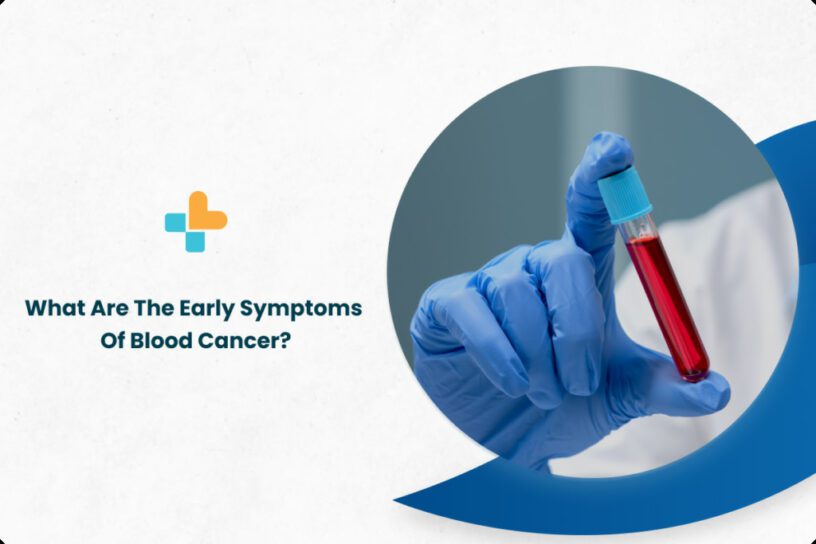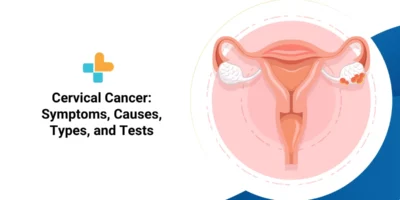Blood cancer is a medical condition in which the tissues that form blood begin to develop uncontrolled. The development and operation of blood cells are both impacted by blood cancer. The lymphatic system and bone marrow are where the majority of blood malignancies begin.
White blood cells (WBCs), red blood cells (RBCs), and platelets are all made in our bone marrow. Blood cancer occurs when the normal process of forming blood cells is disrupted, and aberrant blood cells begin to develop uncontrollably. These abnormal malignant cells disrupt normal cellular processes and cause a variety of diseases.
Symptoms of Blood Cancer
The major symptoms include:
- Heavy breathlessness
- Frequent infections
- Excessive bleeding from gums and wounds
- Massive blood flow during the period
- Back, ribs, joints, and/or bone pain
- Skin alterations (Itchiness)
- Stomach swelling and abdominal soreness
- Enlarged lymph nodes
- Severe abdominal pain
- Pounding headache and eyesight issues
- Frequent weight-loss
- Difficulty in urination
- Spread of little rashes or black patches all over the body.
- Unexpected episodes of sweating and chills
The abbreviation “T.E.S.T” makes it easy to remember the signs and symptoms of blood cancer.
- T – Tiredness or Weakness
- E – Excessive sweating or perspiration
- S – Sore or achy joints and bones
- T – Terrible or severe bruising or bleeding
Types of Blood Cancer
Leukemia, Lymphoma, Myeloma, Myelo Dysplastic Syndromes (MDS), and Myelo Proliferative Neoplasms (MPN) are a few types of blood cancer. Each of them has unique symptoms, prognoses, and therapies. (In medicine, prognosis refers to what is anticipated to occur in the future.)
You will learn more about the precise form of blood cancer you have if you are diagnosed. Hodgkin lymphoma and non-Hodgkin lymphoma are two examples of lymphoma kinds. Acute myeloid leukemia (AML) and chronic lymphocytic leukemia (CLL) are two different types of leukemia (AML).
Acute or chronic blood cancers are two terms that are occasionally used. Acute growth is rapid, whereas chronic growth is gradual.
Treatment For Blood Cancer
Blood cancer can be treated in a variety of ways. Depending on the type of blood cancer you have, you may receive one type of treatment or a combination of them. Popular therapies for blood cancer include chemotherapy, immunotherapy, radiation, targeted medicines, and stem cell transplants.
It’s possible that you won’t require treatment right away if you have a slow-growing blood cancer; in fact, some people never do. This is referred to as “watch and wait.”
Treatments for blood malignancy may have negative effects. Even if they are not receiving treatment, some people still have some of these side effects as a result of the illness itself.
Cost of Treatment
Even the cost of blood cancer treatment in India is relatively reasonable when you consider the high-quality medical facilities and cutting-edge technology thatAyu Health offers its patients. We have the most experienced oncologists that specialize in treating blood cancer using surgery, chemo, bone marrow transplants, biological treatment, etc. At Ayu Health, one can get access to a large pool of Oncologists, who can help and guide you in getting the best treatment. Interested to learn more? Contact us at 636-610-0800.
Our Hospital Locations
Oncology Surgery Hospitals in Bangalore | Oncology Surgery Hospitals in Jaipur | Oncology Surgery Hospitals in NCR | Oncology Surgery Hospitals in Hyderabad
Our Doctors
Oncology Surgery Doctors in Bangalore | Oncology Surgery Doctors in Jaipur | Oncology Surgery Doctors in NCR | Oncology Surgery Doctors in Hyderabad
About the Author

Dr. Shivakumar Uppala
Dr. Shivakumar Uppala is renowned as one of the best Cancer Specialist Doctors in the country, has performed more than 500 surgeries till now, and is an experienced surgical oncologist as well as a consultant. He is practicing at Ayu Health, Bangalore. He is a specialist in Surgical Oncology and MS - General Surgery Laparoscopic Surgeon.




